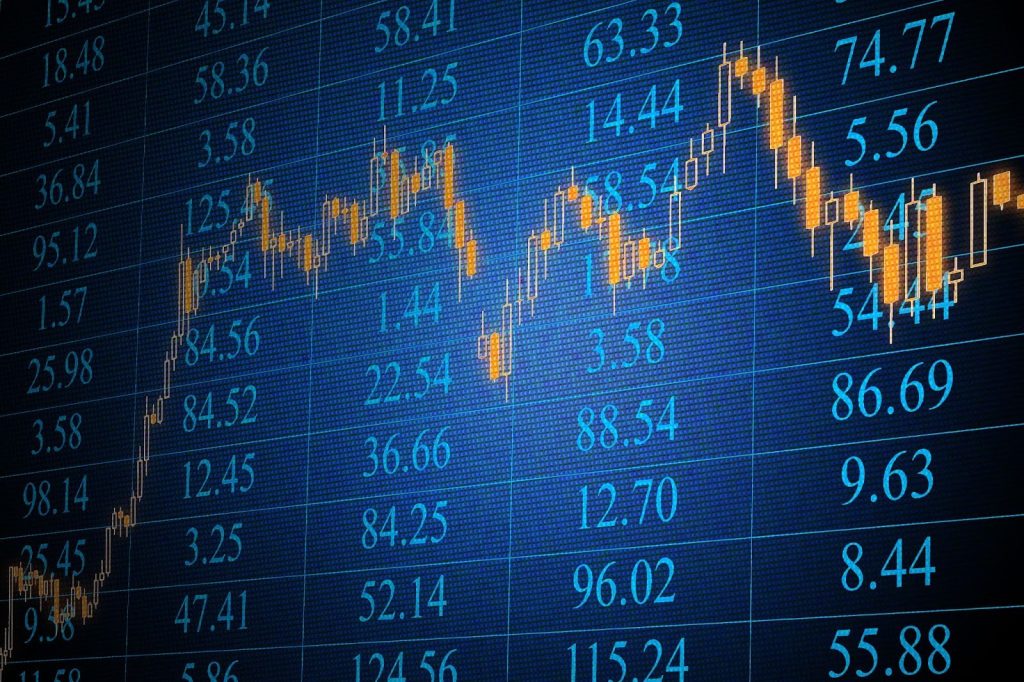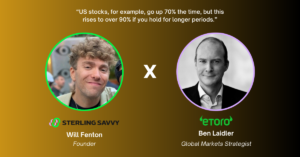Trading CFDs and Forex share some striking similarities – both let you trade with leverage, require no ownership of actual assets, and can be accessed through the same trading platforms.
Yet there are also major differences. While Forex focuses purely on currency pairs in a 24-hour market, CFDs open doors to trading everything from stocks to commodities.
For new traders, understanding these markets’ specific characteristics helps narrow down which might better suit their trading style and goals.
What You’ll Learn:
✓ How CFDs and Forex trading actually work
✓ The differences in costs, markets, and trading hours
✓ Which type of trading might suit your schedule ✓ How leverage works in both markets
✓ The main risks and how to manage them
✓ Whether to start with Forex or CFDs as a beginner
Understanding CFDs and Forex
Let’s cut straight to how each of these actually works – starting with what you can trade and how to make money from them.
What are CFDs?

CFDs (Contracts for Difference) are a bit like making a bet on whether something’s price will go up or down – but you never actually own what you’re trading. Instead of buying actual shares in Tesla or physical bars of gold, you’re simply agreeing with your broker to exchange the difference in price from when you start to when you finish.
In the UK, you can trade CFDs on practically anything that has a changing price – from FTSE 100 companies to cryptocurrencies like Bitcoin. Popular markets include well-known shares, stock indices, commodities like gold and oil, and even forex pairs.
The beauty of CFDs lies in their simplicity: if you reckon something will rise in value, you buy (go long), and if you think it’ll fall, you sell (go short).
One of the most attractive features of CFDs is leverage – essentially borrowed money that lets you control a larger position than your actual capital. However, since January 2018, the Financial Conduct Authority (FCA) has put strict limits on leverage to protect traders. These vary depending on what you’re trading:
- Major forex pairs: up to 30 times your money
- Minor forex pairs and main indices: up to 20 times
- Most commodities: up to 10 times
- Individual shares: up to 5 times
- Cryptocurrencies: just 2 times your money
What is Forex Trading?

Forex trading sits at the heart of London’s financial district, making the UK one of the world’s biggest hubs for currency trading. When you trade forex pairs, you’re simply buying one currency while selling another – trying to profit from tiny price movements.
The forex market never sleeps (well, almost never). It runs 24 hours a day, five days a week, following the sun around the globe from Sydney to Tokyo, London to New York.
This constant activity makes it the world’s largest and most liquid financial market, with popular currency pairs like GBP/USD, EUR/GBP, and GBP/JPY trading hands constantly.
Just like with CFDs, UK forex traders can use leverage to control larger positions, but the same FCA rules apply to protect traders from excessive risk. All legitimate forex brokers in the UK must be regulated by the Financial Conduct Authority, ensuring they follow strict rules about how they handle your money and execute your trades.
This regulation helps make London’s forex market one of the most trusted globally, offering UK traders excellent access to currency trading.
If you’re interested in getting started with Forex trading, you might want to check out our guide to the best Forex trading apps in the UK.
| Key Differences Between CFDs and Forex | ||
|---|---|---|
| Feature | CFD’s | Forex |
| Market Hours | Varies by asset type | 24/5 trading |
| Available Assets | Stocks, indices, commodities, currencies | Currency pairs only |
| Trading Costs | Spread + overnight financing fees + commission (for stocks) | Mainly spread-based |
| Best for | Traders wanting multiple markets | Those focusing solely on currencies |
Pros and Cons of CFD and Forex
The choice between CFDs and Forex often comes down to what suits your trading style. CFDs give you more variety but usually cost more to trade, while Forex is more specialised but generally cheaper.
| CFD Trading Benefits | CFD Trading Drawbacks |
| ✓ Trade multiple markets from one account✓ Start with smaller amounts of money✓ Make money from markets going up or down✓ Access global markets at any time✓ Good for diversifying your trading | ✗ Higher spreads than trading directly✗ Pay fees to hold positions overnight✗ More complex costs to understand✗ Having to track multiple markets |
| Forex Trading Benefits | Forex Trading Drawbacks |
| ✓ World’s most liquid market✓ Trade 24 hours, 5 days a week✓ Simpler fee structure✓ Easy to get in and out of trades✓ No overnight financing fees | ✗ Only currency pairs available✗ Very fast-moving market✗ Need to understand global economics✗ Can be highly volatile |
Factors in Deciding Between CFDs and Forex
When choosing between CFDs and Forex, your decision should match your personal trading style and circumstances. If you’re interested in following specific companies or industries, CFDs let you trade shares directly or focus on sectors you know well.
You might prefer watching tech stocks like Apple or tracking commodity prices in markets you understand. With Forex, you’ll need to focus on how different economies affect currency values – great if you enjoy following global news and economic trends.
Your schedule matters, too. Forex markets rarely sleep during the week, which is perfect if you’re trading around a busy job or in different time zones. But this constant movement means you’ll need to keep a closer watch on your trades.
With CFDs, most markets follow set hours. You might find this easier to manage, especially if you’re trading alongside a day job, as you won’t need to worry about overnight surprises in most markets.
Money and risk go hand in hand with both types of trading. While you can start with similar amounts in either market, think about how much you can comfortably risk. CFDs spread your risk across different types of markets – from shares to gold to currencies.
However, each market has its own rules and risks. Forex focuses purely on currency pairs, which might seem more manageable, but currencies can move sharply when major economic news breaks.
Which Market is Easier for Beginners?
Many people find Forex easier to start with, but this comes with some important catches. Currency trading feels familiar – after all, most of us have exchanged money for holidays or understand why the pound might rise or fall against the dollar.
The Forex market also has some advantages for newcomers: you’re only tracking currency pairs rather than learning about different types of markets, and most currency pairs follow similar patterns and trading rules.
The costs in Forex are usually clearer as well. You’ll typically just pay the spread – the difference between buying and selling prices. CFDs often have more complicated fees, including overnight charges and commissions on some markets.
Not forgetting with Forex, you’re always trading the world’s biggest financial market, which means you can usually buy or sell quickly without waiting.
But don’t let these advantages fool you – Forex isn’t an easy path to profits. Currencies might seem simpler than other markets, but making consistent money from trading takes serious commitment.
You’ll need to understand what drives currency movements, learn proper risk management, and ideally practice with a demo account before risking real money.
The same goes for CFDs – success in either market requires dedication to some serious learning.
Making Your Choice: CFDs or Forex
The attraction of modern trading lies in its flexibility – you’re not locked into one path forever. Many successful traders start with Forex to learn the basics of market movements and risk management, then branch out into CFDs as they discover specific markets that interest them.
Others go straight into CFD trading with a particular focus, like tech stocks or commodities, before exploring currency markets.
Your initial choice matters less than your approach to learning and risk management. Start small, focus on one or two markets you genuinely understand, and give yourself time to learn from both wins and losses.
The markets will always be there tomorrow – there’s no rush to become an expert overnight.
FAQs About About Forex and CFD Trading
Can I trade forex through CFDs?
Yes, you can trade forex CFDs. Many brokers offer both traditional forex trading and forex CFDs. The main difference is that with forex CFDs, you’re speculating on price movements without owning the underlying asset, while traditional forex trading involves directly exchanging currency pairs.
Do I need a licence to trade forex or CFDs in the UK?
No, you don’t need a licence to trade forex or CFDs as an individual trader in the UK. However, you must trade through an FCA-regulated broker.
How can I practice trading without risking real money?
Most UK brokers offer demo accounts that let you trade with virtual money in real market conditions. These practice accounts give you access to live prices, charts and trading tools – everything except the risk.
Can I trade cryptocurrencies through CFDs or Forex?
You can trade cryptocurrencies through CFDs, and some brokers offer crypto-forex pairs like Bitcoin/USD. CFD crypto trading lets you speculate on price movements without owning actual cryptocurrencies, but keep in mind leverage is strictly limited to 2:1 on crypto CFDs.






